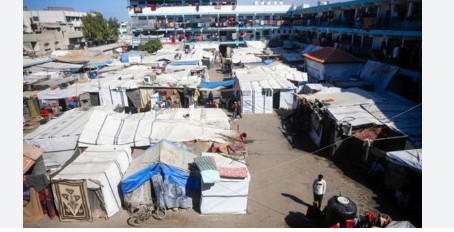New York (Web Desk): The humanitarian crisis in northern Gaza has reached a catastrophic point, with bodies lying in the streets and hospitals facing severe shortages of vital medical supplies, the United Nations Relief and Works Agency (UNRWA) warned on Tuesday.
Louise Wateridge, UNRWA's senior emergency officer, briefed reporters in Geneva, describing the situation as “nothing short of catastrophic” as aid continues to be restricted, and the suffering intensifies.
As winter approaches, Wateridge highlighted the grave risk posed to the nearly 500,000 displaced people in Gaza who are already living in makeshift shelters.
With sewage surrounding these temporary homes, the arrival of seasonal rains could worsen their plight, particularly for those living in areas prone to flooding.
Wateridge voiced deep concern about how these individuals, already in desperate need of basic necessities, will survive as conditions deteriorate further.
The flow of humanitarian aid into Gaza has been drastically reduced, with the number of aid trucks entering the enclave dropping to a mere 37 per day in October. This represents just 6% of the supplies that were being allowed into Gaza before the conflict began.
UNRWA officials also noted that, despite the US setting a deadline for Israel to improve aid access by November 12, the situation has only worsened, with supplies dwindling rather than increasing.
Wateridge revealed that in northern Gaza, the UN's efforts to deliver aid have been blocked for over a month, leaving the population without food and water. She cited disturbing reports that 1.7 million people in Gaza – approximately 80% of the population – missed their food rations in October.
Last week, experts from the UN-partnered Integrated Phase Classification (IPC) Famine Review Committee issued a warning about the looming threat of famine in the northern parts of Gaza.
The situation inside hospitals is equally dire. Doctors in the northern region report running out of essential blood supplies and medicine, while ambulances have ceased functioning.
People are now forced to make their own way to hospitals, often resorting to donkey carts, as the infrastructure in the region collapses under the weight of the ongoing conflict.
The eight water wells operated by UNRWA in northern Gaza’s Jabalia area have also stopped working, leaving communities without access to clean drinking water.
Wateridge emphasized the urgency of gaining access to northern Gaza, stressing that the need for aid is growing by the hour. She also pointed to the broader geopolitical context, noting that the Israeli Parliament had recently passed a law banning UNRWA’s operations in Israel, further complicating efforts to provide aid.
In her statement, Wateridge called for a ceasefire, urging both Hamas and Israeli forces to halt the violence.
She condemned the horrific attacks by Hamas on October 7 and the subsequent suffering of civilians in Gaza, underscoring that a ceasefire is essential to ensure the safe return of hostages, provide humanitarian relief, and bring respite to all civilians in the region.
The UN agency’s message was clear: without immediate action, the human toll in Gaza will only worsen, with both Palestinian and Israeli civilians continuing to bear the brunt of the conflict.


